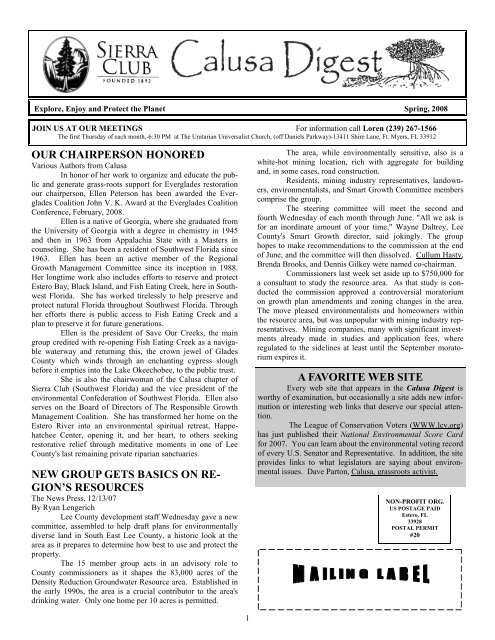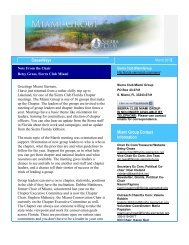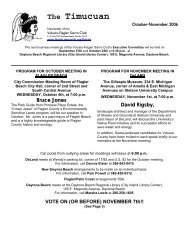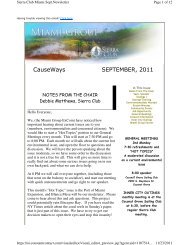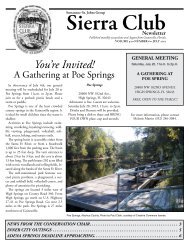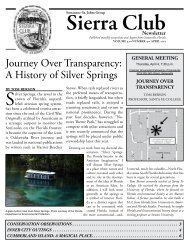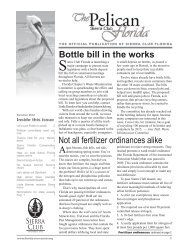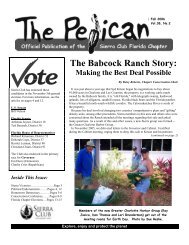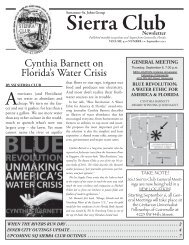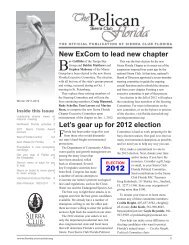Spring 2008 Calusa Digest - Sierra Club Florida
Spring 2008 Calusa Digest - Sierra Club Florida
Spring 2008 Calusa Digest - Sierra Club Florida
Create successful ePaper yourself
Turn your PDF publications into a flip-book with our unique Google optimized e-Paper software.
Explore, Enjoy and Protect the Planet <strong>Spring</strong>, <strong>2008</strong><br />
JOIN US AT OUR MEETINGS For information call Loren (239) 267-1566<br />
The first Thursday of each month,-6:30 PM at The Unitarian Universalist Church, (off Daniels Parkway)-13411 Shire Lane, Ft. Myers, FL 33912<br />
OUR CHAIRPERSON HONORED<br />
Various Authors from <strong>Calusa</strong><br />
In honor of her work to organize and educate the public<br />
and generate grass-roots support for Everglades restoration<br />
our chairperson, Ellen Peterson has been awarded the Everglades<br />
Coalition John V. K. Award at the Everglades Coalition<br />
Conference, February, <strong>2008</strong>.<br />
Ellen is a native of Georgia, where she graduated from<br />
the University of Georgia with a degree in chemistry in 1945<br />
and then in 1963 from Appalachia State with a Masters in<br />
counseling. She has been a resident of Southwest <strong>Florida</strong> since<br />
1963. Ellen has been an active member of the Regional<br />
Growth Management Committee since its inception in 1988.<br />
Her longtime work also includes efforts to reserve and protect<br />
Estero Bay, Black Island, and Fish Eating Creek, here in Southwest<br />
<strong>Florida</strong>. She has worked tirelessly to help preserve and<br />
protect natural <strong>Florida</strong> throughout Southwest <strong>Florida</strong>. Through<br />
her efforts there is public access to Fish Eating Creek and a<br />
plan to preserve it for future generations.<br />
Ellen is the president of Save Our Creeks, the main<br />
group credited with re-opening Fish Eating Creek as a navigable<br />
waterway and returning this, the crown jewel of Glades<br />
County which winds through an enchanting cypress slough<br />
before it empties into the Lake Okeechobee, to the public trust.<br />
She is also the chairwoman of the <strong>Calusa</strong> chapter of<br />
<strong>Sierra</strong> <strong>Club</strong> (Southwest <strong>Florida</strong>) and the vice president of the<br />
environmental Confederation of Southwest <strong>Florida</strong>. Ellen also<br />
serves on the Board of Directors of The Responsible Growth<br />
Management Coalition. She has transformed her home on the<br />
Estero River into an environmental spiritual retreat, Happehatchee<br />
Center, opening it, and her heart, to others seeking<br />
restorative relief through meditative moments in one of Lee<br />
County's last remaining private riparian sanctuaries.<br />
NEW GROUP GETS BASICS ON RE-<br />
GION’S RESOURCES<br />
The News Press, 12/13/07<br />
By Ryan Lengerich<br />
Lee County development staff Wednesday gave a new<br />
committee, assembled to help draft plans for environmentally<br />
diverse land in South East Lee County, a historic look at the<br />
area as it prepares to determine how best to use and protect the<br />
property.<br />
The 15 member group acts in an advisory role to<br />
County commissioners as it shapes the 83,000 acres of the<br />
Density Reduction Groundwater Resource area. Established in<br />
the early 1990s, the area is a crucial contributor to the area's<br />
drinking water. Only one home per 10 acres is permitted.<br />
1<br />
The area, while environmentally sensitive, also is a<br />
white-hot mining location, rich with aggregate for building<br />
and, in some cases, road construction.<br />
Residents, mining industry representatives, landowners,<br />
environmentalists, and Smart Growth Committee members<br />
comprise the group.<br />
The steering committee will meet the second and<br />
fourth Wednesday of each month through June. "All we ask is<br />
for an inordinate amount of your time," Wayne Daltrey, Lee<br />
County's Smart Growth director, said jokingly. The group<br />
hopes to make recommendations to the commission at the end<br />
of June, and the committee will then dissolved. Cullum Hasty,<br />
Brenda Brooks, and Dennis Gilkey were named co-chairman.<br />
Commissioners last week set aside up to $750,000 for<br />
a consultant to study the resource area. As that study is conducted<br />
the commission approved a controversial moratorium<br />
on growth plan amendments and zoning changes in the area.<br />
The move pleased environmentalists and homeowners within<br />
the resource area, but was unpopular with mining industry representatives.<br />
Mining companies, many with significant investments<br />
already made in studies and application fees, where<br />
regulated to the sidelines at least until the September moratorium<br />
expires it.<br />
A FAVORITE WEB SITE<br />
Every web site that appears in the <strong>Calusa</strong> <strong>Digest</strong> is<br />
worthy of examination, but occasionally a site adds new information<br />
or interesting web links that deserve our special attention.<br />
The League of Conservation Voters (WWW.lcv.org)<br />
has just published their National Environmental Score Card<br />
for 2007. You can learn about the environmental voting record<br />
of every U.S. Senator and Representative. In addition, the site<br />
provides links to what legislators are saying about environmental<br />
issues. Dave Parton, <strong>Calusa</strong>, grassroots activist.<br />
NON-PROFIT ORG.<br />
US POSTAGE PAID<br />
Estero, FL<br />
33928<br />
POSTAL PERMIT<br />
#20
Everglades Coalition Conference Report<br />
By Carl Veaux (<strong>Calusa</strong> board member and another<br />
grassroots activist)<br />
Mon, 4 Feb <strong>2008</strong><br />
The <strong>Florida</strong> panther needs more lands so it will<br />
propagate to a population of about 440 which the<br />
state wants to do. That means more private lands need to<br />
be converted to refuge lands. The 8 Texas panthers have<br />
been recaptured so that the <strong>Florida</strong> strain will once again<br />
become pure. The numbers have increased from 20 to<br />
30 to 80-100. The panthers have been attacking farm<br />
animals in the Big Cypress community so again we need<br />
more panther lands. Of course, the biggest threat to panthers<br />
is the automobile with a dozen or so kills this past<br />
year alone<br />
It was the consensus of the 4 different meetings I<br />
attended that the BIG O WATERS NEED TO FLOW<br />
SOUTH. At the ending session this was the biggest item<br />
to be obtained and the stakeholders want it to be done<br />
ASAP. One hydrologist I talked to said that it will take<br />
huge settling ponds at the right water depths to cleanse<br />
the water so it will be fit to supply the river of grass with<br />
the water quality it needs to keep the grass and other<br />
plants from dieing.<br />
The snail kite is on the verge of becoming extinct<br />
because of the low and high levels of the Big O in the last<br />
6 or 7 years. Where in the past their have been<br />
400 active nests it has dropped to 25 nests. This is rather<br />
alarming in that the lake has to be 14 to 16 feet for optimum<br />
breeding periods. The lack of nests also is the fault<br />
of low snail populations. They are trying to introduce another<br />
hardier species of snail to take their place and are<br />
releasing more snails from a captive breeding program.<br />
I talked to the Secretary of the Interior about the<br />
National Artic Wildlife Refuge and she said it was on the<br />
back burner and not to be reopened or discussed<br />
soon .There is a ten year moratorium on the lake that<br />
skirts near the front of the refuge.<br />
The most alarming part of the program was given<br />
by an address of a Miami University Professor who said<br />
that global warming is moving much faster than anyone<br />
had anticipated and in little more than 3 decades one<br />
third of <strong>Florida</strong> could be under water. You could hear a<br />
pin drop when he reported these dire results of global<br />
warming to a huge luncheon crowd. He even showed<br />
how the mangroves are dieing because of high water.<br />
Rae Ann Wessel gave a great history and power<br />
point presentation of woes the Caloosahatchee River.<br />
People raved over it.<br />
Last of all but not least, Ellen Peterson received<br />
the coveted activist award and was given a beautifully<br />
marked crystal bowl. Which I hope you'll all get to see.<br />
Buy FPL STOCK! Ellen's advice.<br />
I talked to Bill Nelson and other governmental<br />
types about getting the funding for the Big O so these<br />
objectives can be reached.<br />
COMMON SENSE AND SCIENCE SAY<br />
FORGET THE FERTILIZER<br />
The News Press, 1/8/08<br />
Marti Daltrey (<strong>Calusa</strong>'s own, grassroots all the way )<br />
2<br />
I would like to address the comments made by the critics of the<br />
stronger fertilizer ordnance.<br />
The quote ("Fertilizer limits feed debate," January 2)<br />
from the Chem Lawns representative that "common sense is<br />
not science" demonstrates a limited understanding of the application<br />
of both science and common sense and public policymaking.<br />
The Precautionary Principle, used by schools, social<br />
and environmental organizations as well as the US government<br />
in creating and deciding on public policy, is the effect of marriage<br />
of these two concepts<br />
The recent publication, "Precautionary Tools for Reshaping<br />
Environmental Policy," states, "The Precautionary<br />
Principle calls for taking action against threatened harm to people<br />
and echo systems even in the absence of scientific certainty.<br />
"The rationale is that modern technologies and human<br />
activities can inflict long-term global scale environmental damage<br />
and that conclusive scientific evidence of such damage<br />
may be available to late to avert it."<br />
One should not abandon either science or common<br />
sense when making an informed decision regarding the sustainable<br />
use of our natural resources.<br />
In this instance, Lee County has moved beyond a bygone<br />
era of "tobacco science" and into a realm of collaborative<br />
policymaking with input from the entire community.<br />
In response to Professor Trenholm's comment that<br />
buffer zones of 25 feet are ridiculous, it should be noted that<br />
the 25 foot buffer was established in the South <strong>Florida</strong> Water<br />
Management District rules for environmental resource permit<br />
applications.<br />
In addition, the southwestern region of the FDEP recommends<br />
that homeowners "do not apply fertilizer or pesticides<br />
within at least 25 feet of the water edge or the wetlands."<br />
Furthermore, the EPA recommends a minimum riparian buffer<br />
of at least 7 m, or almost 23 feet, to treat and remove nitrogen<br />
from storm water in urban areas.<br />
Either SWFMD, the DEP and the EPA are all mistaken<br />
or her "sound" scientific opinion is nothing more than an<br />
erroneous "sound bite."<br />
<strong>Florida</strong> has been in the throes of a decreased rain cycle<br />
and the resulting drought that has persisted and may continue<br />
for several years.<br />
Due to the continuing urban sprawl, population<br />
growth, and dry weather conditions, our water resources are<br />
threatened. To spend our finite water supply on the maintenance<br />
of emerald green lawns and water hungry exotic plants is<br />
a waste of precious resources.<br />
We are all affected by water pollution, water quality<br />
and water availability. Our health our economy and our environment<br />
depend upon it. We all need to take responsibility to<br />
ensure that there will be water for everyone in Southwest <strong>Florida</strong>.<br />
Responsible actions include changing our water wasting<br />
habits and reducing our water consumption by using native<br />
plants and ground covers, and reducing our use of fertilizer to<br />
prevent excessive nutrient runoff.<br />
The trend towards a more sustainable echo friendly<br />
landscape is growing. Let's make the sensible changes now<br />
before time and our water run out.<br />
-- Marti Daltrey is regional community organizer for the <strong>Sierra</strong><br />
<strong>Club</strong>'s Fort Myers office.
STEWARD OF LAND, WATER<br />
Bonita Banner By Jonna Rubin (contact) Saturday, January 19,<br />
<strong>2008</strong> (another of <strong>Calusa</strong>’s board members)<br />
The sound of traffic whirring by on I75 is the only<br />
reminder that time has not, indeed stood still behind Cullum<br />
Hasty’s Kent Rd. home. An old dock rests overlooking a quiet<br />
pond, the only remnant of this part of Imperial River in the<br />
throes of the dry season.<br />
"If we're lucky we'll see some otters," said Hasty,<br />
pointing to the water. "There are still fish in there, and they<br />
rely on it through the winter"<br />
The idea of landscaping as most Floridians know it is<br />
absent from the grounds. Hasty gestured to the vegetation,<br />
"The way we see it right now is the way it could have been a<br />
hundred years ago."<br />
If it seems careless and unkempt, Hasty reassures that<br />
it is quite deliberate. The longtime environmentalist and local<br />
activist has built his life around protecting the old <strong>Florida</strong> he<br />
loves, and though he did make a few changes to the landscape -<br />
a butterfly garden on the front of his property was put in by<br />
hasty himself -his goal is to preserve things exactly as nature<br />
intended.<br />
Hasty, 64, he grew up outside of Miami, moving to<br />
Southwest <strong>Florida</strong> in the early 1990s, ironically, because he<br />
was tired of traffic and congestion.<br />
"It was a different world out here," said Hasty. "And<br />
sadly, it's disappearing." It's a sentiment echoed by many longtime<br />
residents who moved here for a piece of quiet paradise,<br />
but Hasty has no patience for idle complaining.<br />
"Sure, I like to complain a lot about how things are<br />
being ruined," he said. "But if you're going to complain, you<br />
have to be involved, so I became a serial volunteer."<br />
And volunteer he does. Hasty not only serves as the<br />
political chair for the <strong>Calusa</strong> Group of the <strong>Sierra</strong> <strong>Club</strong>, but he's<br />
on the executive committee for the state organization. The<br />
number of city and county committees he is a member of reads<br />
like a laundry list. Conservation Land Acquisition and Stewardship<br />
Advisory Committee; Agency on Bay Management;<br />
Bonita <strong>Spring</strong>s City Council Local Planning Agency and the<br />
council was Tree Advisory Committee, to name a few. He is<br />
the official keeper of the river, ensuring that its banks are clear<br />
and that no illegal dumping takes place. He is actively working<br />
with the city to develop a public hiking trail and kayak launch<br />
along the Imperial River, aiding in the acquisition of parcels of<br />
waterfront property so that everyone can enjoy the beauty he<br />
sees on a regular basis.<br />
"It was his idea... he recognized that most of the land<br />
was in the hands of various government entities and that very<br />
little land had to be purchased to complete the trail," said Bonita<br />
<strong>Spring</strong>s Mayor Arend. "When completed, it will be a quality<br />
walkway."<br />
To Lee County Commissioner Ray Judah, Hasty was a<br />
natural fit for the Density Reduction/Groundwater Resource<br />
(DR/GR) Steering Committee, the group that helps determine<br />
the ongoing fate of approximately 96,000 acres of Lee County's<br />
most environmentally sensitive lands. "Cullum is a genuine<br />
soul with tremendous passion and high regard for the entire<br />
Lee County Community," said Judah. "I know he resides in<br />
Bonita <strong>Spring</strong>s, but he is truly a strong advocate for the entire<br />
county. Because of his involvement with Bonita <strong>Spring</strong>s, and<br />
3<br />
as they evaluate how best to properly plan and protects the DR/<br />
GR in their boundaries, he was a natural to represent the interests<br />
of South Lee County. He's just a wonderful ambassador<br />
because of his deep commitment to protect the integrity of our<br />
environment, and I value his perspective and advice, and Lee<br />
County is lucky to have him as a resident."<br />
Hasty is also quick to point out that the DR/GR is so<br />
much more than water recharge, as many believe. "This land is<br />
so much more than recharging the water supply. The<br />
‘resource’ heart of the equation also includes the critters - the<br />
gopher tortoises, the butterflies, the birds. And the water running<br />
across the open land is cleansing."<br />
It's the critters that drive much of Hasty's love for nature.<br />
A friend to animals since his childhood, he recalls being<br />
enthralled by a spider building a web and keeps a small bat<br />
house on the side of this home, working hard to create the ideal<br />
conditions for the winged mammals. Dumpling, his pet Italian<br />
mastiff, is a rescue given to him by his brother. Hasty believes<br />
she was used in a puppy mill for bully breeds, and she closely<br />
resembles a pit bull.<br />
Ellen Peterson, of Estero, chairman of the <strong>Calusa</strong><br />
Group, is familiar with Hasty’s love for the earth and all who<br />
inhabit it. But mostly, Peterson is impressed with his ability to<br />
get things done.<br />
"He has a great facility for contacting people in the<br />
community who can provide support or need to be reached for<br />
information or for assistance in environmental issues," said<br />
Peterson. "He takes national issues and really makes them applicable<br />
to the local area where he lives."<br />
That attitude is certainly reflected in his estate.<br />
Tucked away on a dead end cul-de-sac on Kent Rd. Hasty<br />
keeps his home green whenever possible, driving a Honda hybrid<br />
and employing a deceptively simple low energy water<br />
heater. A traditional water heater is draped in black and encased<br />
in glass and placed in the full sun in his front yard to<br />
preheat the water, which cuts go energy use down significantly.<br />
Hasty adds that the only moving parts use about the same energy<br />
as a 60-watt bulb.<br />
And then, of course, there's his solar powered clothes<br />
drier. "I tell people that I have one, and their eyes light up,"<br />
said hasty with a laugh. And then I point to the clothesline in<br />
the front yard. People spend a lot of time on high tech solutions;<br />
sometimes the best thing is right in front of us."<br />
READER’S PUZZLE<br />
The puzzle in the last issue was far too difficult. We<br />
apologize. The correct answer: comments from a speech on an<br />
agenda for global warming given in the U.S. Senate by Al<br />
Gore.<br />
Our question for this issue is which U.S. Senator recently<br />
made the following remark about the global warming<br />
crisis: “I’ve been in conversations with former Vice President<br />
(Al) Gore repeatedly, and his recommendation, which I think<br />
is sound, is that you can’t wait until you are sworn into office<br />
to get started." If you know who made this comment, then email<br />
your answer to dpart31@aol.com and you may win the<br />
puzzle prize for this issue.<br />
Ideas for a future Reader’s Puzzle should be sent to<br />
the above web address.
<strong>Sierra</strong> <strong>Club</strong> General Observations<br />
Donald M. Ehat, Ed.D. (Another of <strong>Calusa</strong>’s grass roots activists)<br />
Feb 26, <strong>2008</strong><br />
As a result of reading "Thoughts on Project Renewal"<br />
from Carl Pope and considering the kinds of staffing actions by<br />
the national leadership, it would appear to me that the <strong>Sierra</strong><br />
<strong>Club</strong> is undergoing a significant change in organizational philosophy.<br />
It appears that the national leadership is taking seriously<br />
the need for more expeditious and predictable executive<br />
action to deal with the complex changes taking place in society.<br />
Many new paid staff members are being introduced and<br />
new permanent staffed offices set up around the state. These<br />
actions reflect an interest on the part of the national office to be<br />
able to reach local groups directly with people who are paid to<br />
execute national initiatives. Recently the national office found<br />
them selves in the anomalous position of backing a plan to<br />
move the state legislature to initiate a program to modify the<br />
type of coal to be burned in a new coal fired power plant to be<br />
built in Glades County. The state <strong>Sierra</strong> organization sponsored<br />
a plan to stop the construction of the coal plant entirely;<br />
not change its fuel type. The state plan was approved by the<br />
Governor and the plans for the power plant were shelved. This<br />
doesn't look like the actions of a highly integrated, effective<br />
organization.<br />
It is also instructive to see that not a great deal of organizational<br />
development money has been committed to providing<br />
training on the local level to help local groups to make<br />
maximum use of the new, convenient, national staff. The <strong>Sierra</strong><br />
<strong>Club</strong> has been traditionally a bottom-up organization with<br />
local groups operating in a fairly autonomous fashion taking<br />
responsibility for making plans and accepting the consequences<br />
for their own actions. The National Office seems to be modeling<br />
the ubiquitous top-down business model which has found a<br />
significant number of middle management to be unnecessary<br />
for communication inside the organization. Technology and<br />
computers have deftly moved into that role making much of<br />
middle management unnecessary. It looks to me that the state<br />
organizations are viewed by national as an unnecessary encumbrance<br />
to efficient implementation of national policy. National<br />
actions toward the <strong>Florida</strong> chapter seem to be the most obvious<br />
action along this streamlining road.<br />
These observations are based on very sketchy evidence.<br />
If I am wrong, then the 'Healing' mode presented above<br />
should be seriously considered by <strong>Sierra</strong> <strong>Club</strong> management as a<br />
credible way to resolve the '<strong>Florida</strong> situation' within the democratic<br />
traditions which have contributed so well to the wonderful<br />
<strong>Sierra</strong> <strong>Club</strong> image as the leading voice of Environmental stewardship.<br />
Skyscrapers in Miami, Polar Bears and<br />
Power Outages<br />
By gimleteye, Eye on Miami, February 27, <strong>2008</strong><br />
Flying across the country, I ignored at first but slowly<br />
became glued to "Arctic Tale"-- a documentary feature filled<br />
with superb photography chronicling global warming. Tens of<br />
thousands of years of habituation to the seasonal cycles and<br />
millions of years of evolution are vanishing in the rapidly<br />
warming Arctic.<br />
It is difficult enough to focus on climate, riding a Boeing<br />
757 that joins with tens of thousands of other aircraft in<br />
contributing to the man-made disaster. A main story thread<br />
4<br />
tracks the fate of a mother and her two polar bear cubs. The<br />
care of the mother for her offspring is so obviously resonant of<br />
how we worry for and tend to and push forward our own<br />
young.<br />
An unstable ice pack, melting far earlier than normal,<br />
forces the mother to abandon her offspring earlier than evolution<br />
provided to balance the odds of survival. My flight landed<br />
before the movie ended, but what I heard just before the movie<br />
clicked off stuck with me: "Leaving her cub earlier that she<br />
should have, the mother could not teach the survival skills her<br />
cub would need to survive."<br />
I wonder in the context of our own species: will there<br />
be a time when mothers and fathers cannot give the next generation<br />
the skills it will need<br />
to survive?<br />
We are dependent on massively organized infrastructure<br />
for modern life. The connections that tie the pieces together<br />
are more fragile than people realize. How uncomfortable<br />
life can become when we are deprived was demonstrated,<br />
yesterday, by a brief power outage of the power grid serving<br />
the entire southeast coast of <strong>Florida</strong>.<br />
The grid failure instantly stopped traffic and otherwise<br />
interrupted the lives of millions of residents and visitors. What<br />
would life be like, without the power grid? We know from experience<br />
in the aftermath of recent hurricanes. So far the power<br />
grid, and the network of comforts we depend on, springs back.<br />
In the future, global warming and its impacts will provide<br />
a much more serious test to infrastructure connections<br />
including the power grid.<br />
For decades, the polar bear has been an iconic symbol<br />
of nature for conservationists. Today its plight is a flashingwarning<br />
light for all of humanity. The cautionary tale may be<br />
attracting select audiences, but it is still falling on deaf ears.<br />
Otherwise, how to explain today's news in Miami?<br />
City commissioners are poised to approve two new towering<br />
skyscrapers, over 1000 feet tall, in the downtown core. Never<br />
mind that real estate markets are under the heaviest pressure, in<br />
a century. The story is featured on the front page of The Miami<br />
Herald, without a single wisp of concern or doubt.<br />
Taken together: the polar bears, the power outage, and<br />
the hubris of Miami civic leaders and elected officials sound<br />
clarion bells for change. The focus for public life should be<br />
massive reform of power generation, distributing generation<br />
and supply as closely as possible to the end user and to consumers.<br />
Elected officials in places like South <strong>Florida</strong> should<br />
reject building applications and zoning approvals that do not<br />
meet the criteria for surviving for long periods of sustained<br />
stress on infrastructure; from power generation to water supply.<br />
I know, these are big "shoulds".<br />
The polar bear is unlikely to adapt to the pressure of<br />
global warming on food supplies. Presumably, we are smart<br />
enough to plan strategies to cope.<br />
It is incredibly foolish to imagine that we will be immune<br />
or wealthy enough to avoid what threatens the polar bear.<br />
You may not be the mother or father<br />
who tells your children, tough luck. But your children or grandchildren<br />
will<br />
experience the costs; they will ask the questions, in which 1000<br />
foot tall<br />
skyscrapers in Hurricane Alley will be the height of folly.<br />
Thanks to Rhonda Roff (Another <strong>Calusa</strong> grassroots activist)
2007 OUTINGS PROGRAM REPORT<br />
CALUSA GROUP OF THE SIERRA CLUB<br />
(Submitted by Outing Chair, Brigita Gahr, another of <strong>Calusa</strong>’s own grassroots activist)<br />
Scheduled Outings:<br />
Twelve trips were advertised, however, four were cancelled due to the reasons indicated below. The last two trips will<br />
be rescheduled in <strong>Spring</strong>, <strong>2008</strong>.<br />
Date Outing Location/Activity Participant #<br />
Jan. 13 Estero Bay Buffer Hike 15<br />
Feb. 24-25 Fakahatchee Swamp Walk, Camping, Canoeing, Hiking 15<br />
Mar. 18 Big Cypress Hike 13<br />
Apr. 14 Kayak to Cape Romano (cancelled due to lack of participants)<br />
May 26-28 Silver River Camping & Juniper <strong>Spring</strong>s Paddle 12<br />
July 13 Bowditch Beach Walk & Sunset Dinner 5<br />
Aug 11 Kayak Isles of Capri (cancelled due to lack of participants)<br />
Sept. 1 Hickey’s Creek Area Nature Walk 11<br />
Sept. 15 Coastal Cleanup- Ft. Myers Beach 5<br />
Oct. 7 Fisheating Creek Paddle 15<br />
Oct. 27 <strong>Calusa</strong> Ghost Tour Paddle & Walk (postponed due to weather)<br />
Nov. 17 Clam Bayou Paddle & Picnic (cancelled due to lack of participants)<br />
2007 TOTAL = 91<br />
Leader Training:<br />
Joe and Kim Staigner successfully completed the <strong>Sierra</strong> <strong>Club</strong>’s Outing Leader 101 Training and Basic First Aid Training.<br />
Additional certified <strong>Calusa</strong> Group Outing Leaders are Victor Hill and Brigita Gahr.<br />
NEW BOARD MEMBERS TO WELCOME!<br />
First we have Rhonda Roff who is our new energy chair.<br />
Welcome Rhonda.<br />
About me: BA Chemistry Rutgers '82 Environmental analytical chem and project management in NJ<br />
83-89. Defected to the non-profit world when unable and unwilling to lie for corporate clients even when threatened.<br />
NRDC Enforcement Project scientist: brought citizen suits under federal environmental statutes. Association of NJ Environmental<br />
Commissions: NJ Public Participation Coordinator for NY/NJ Harbor Estuary Program. Seminole Tribe of <strong>Florida</strong> - Water Resource<br />
Management Department: Permitting and Environmental Education. Save It Now Glades! – president. Mom in a family who<br />
(mostly) understands.<br />
Soon, Don Ehat will be joining us as our new secretary. More about Don will be forthcoming.<br />
With their history as environmental grassroots activists and backgrounds they will add a great deal to the <strong>Calusa</strong> Group. We are all<br />
looking forward to working with such wonderful people.<br />
WHO WE ARE<br />
ON THE WEB http://florida.sierraclub.org/calusa<br />
Ellen Peterson Chair 239-992-5455 ecrone1@gmail<br />
Bobbie Lee Gruninger Vice Chair & Special Events 239-495-5891 bleegruninger@comcast.net<br />
Lori Cloutier Conservation 239-992-1565 rosesplus@comcast.net<br />
Corey Hyde Flexcom 239-887-0095 cmhjunques@yahoo.com<br />
Cindy Kraft Treasurer 239-851-1969 csk.1952@hotmail<br />
Connie Langmann Publicity 239-694-5513 GAEAKayaks@aol.com<br />
Loren Wieland Newsletter & Membership 239-2671566 Lorenlw@aol.com<br />
Brigita Gahr Outings 239-337-1857 bbgahr@embarqmail.com<br />
Cullum Hasty Political & ABM Rep. 239-948-8653 cullumhasty@comcast.net<br />
Carl Veaux Babcock Rep 239-549- 7265 cveaux@aol.com<br />
Dave Parton Holton Preserve 239-415-8402 dpart31@aol.com<br />
Rhonda Roff Energy Chair 863-983-4639 marshmaid@hughes.net<br />
5
UPCOMING EVENTS<br />
Cynthia Barnett,<br />
Thanks to Pete Quasius<br />
A great follow-up to the FGCU/Rookery Bay climate change teach-in - a lecture by Cynthia Barnett on our water problems. Only<br />
room for 200. Free, but reservations requested. Please email Lori at Collier County Audubon and let her know if you are coming<br />
and bring friends. Lori Beall" lbeall@collieraudubon.org<br />
Cynthia Barnett, author of Mirage, <strong>Florida</strong> and the Vanishing Waters of Eastern US. www.amazon.com/Mirage-<strong>Florida</strong>-<br />
Vanishing-Water-Eastern/dp/0472115634. Will be speaking at FGCU in Academic Building 5 at 10 AM on April 12th. The program<br />
is co-sponsored by Collier County Audubon Society, Audubon of Southwest <strong>Florida</strong> and FGCU.<br />
AB 5 is building 21 and parking is available in Parking Lot 1 and 2.<br />
"First International Conference on Mining Impacts to the Human and Natural Environments.”<br />
Will be held on Saturday, March 15, <strong>2008</strong> at the ECC-Charlotte Campus in Punta Gorda from 8;00-4:00<br />
Brought to you by the Responsible Growth Management Coalition.<br />
The conference focuses on adverse impacts from mining currently not addressed or evaluated by<br />
regulatory agencies and municipalities, as well as alternatives to mining and approaches for improved<br />
monitoring and evaluation of existing and proposed mine sites and mine-related impacts. Thanks to the<br />
volunteer efforts of scientists, other professionals and citizens, combined with sponsorship by the<br />
organizations below to cover conference costs, this conference is free and open to the public. This<br />
conference strives to be 100% carbon neutral and environmentally friendly.<br />
Lunch (pre-ordered or on your own)<br />
Registration<br />
The conference is free and open to the public, but on-line registration is required. Space is limited and attendance will<br />
be confirmed based on those with the earliest registration dates. If the number of registrants exceeds the capacity of the<br />
conference room, individuals who have not checked in at the registration desk by 8:00 AM the day of the conference will<br />
forfeit their space to late registrants who have checked in at the registration desk by 8:00 AM. On-line registration and<br />
other conference information is available at www.crms.uga.edu/MiningConference.<br />
EARTH DAY <strong>2008</strong><br />
Plans are well under way for the <strong>2008</strong> Earth Day festival. There will be music, Art, Food, free kayaking rides,<br />
kid’s activities, environmental presentations and much more! The day will end with a drum circle. The drum circle<br />
is open to the public. This year local Artist Angie Brooks, will be doing a Mandala. She is setting it up so<br />
anyone who wants to can participate in coloring it in. Angie is also organizing art work for the kids, she will be<br />
handing out Mandalas on 8 by 10 papers for the kids to color in. These works will be displayed through out the<br />
day.<br />
We are looking forward to the day. The festival will be held at Koreshan State Park on April 19th. It will start at<br />
10:00 am and finish at 3:00 pm. The drum circle will start at 4:00 pm after the vendors have broken down. We<br />
always have the drum circle at the end of the festival so folks who have worked the event can relax and enjoy it;<br />
sitting around the Drum circle catching a beat is a great way to end the day.<br />
We ask everyone to remember to bring a folding chair or blanket so they can have a comfortable place to sit<br />
while listening to the music through out the day. Bring your appetite, the Lions club will be doing a BBQ and<br />
For Goodness Sake health food store will be there with turkey and veggie wraps too!<br />
The festival is a great way to find out about local and national environmental issues. Many environmental<br />
groups will be on hand working booths all day. We will be running environmental presentations back to back<br />
all day long inside the founder’s home. As you enter the festival we will be handing out programs so you will<br />
know which presentations will be running at what times.<br />
Anyone who is interested in helping out for an hour or two is welcome. There is much we can always use help<br />
with. If you want to help or have any questions about the day please contact Bobbie Lee at bleeguninger@comcast.net<br />
call 495-5891.<br />
Bobbie Lee Gruninger, Vice. Chair Person / Special Events Coordinator (another <strong>Calusa</strong> grassroots activist).<br />
6
May 16 is Endangered Species Day: <strong>Sierra</strong> <strong>Club</strong> Among Many Co-Sponsors<br />
By Christine Williamson, Chicago Group Conservation Chair, member of <strong>Sierra</strong> <strong>Club</strong>’s Wildlife & Endangered Species Committee<br />
May 16 is the third annual U.S. Endangered Species Day and the timing couldn’t be better.<br />
Not only are birds migrating and prairies, forests, deserts, marshes, pastures and parks greening across America, but many environmentalists<br />
remain concerned about last year’s behind-the-scenes shenanigans in Washington D.C. and their impact on the plight of<br />
endangered animals, plants, birds, insects and reptiles.<br />
Last year, national media seized on news from the Inspector General’s office that Bush administration appointee to the Department<br />
of the Interior, Julie MacDonald, routinely altered scientific research and leaked sensitive information to industry groups.<br />
Ms. MacDonald, thankfully, is no longer employed by the department and the Bush administration was forced to order a review of<br />
the threatened and endangered listing decisions of seven species including the Canadian Lynx, the California Red-legged Frog and<br />
the Preble’s Meadow Jumping Mouse.<br />
Last March, another leak from the Interior Department revealed that the agency had been busy behind closed doors drafting<br />
regulations that would seriously undermine key provisions of the Endangered Species Act protections.<br />
The <strong>Sierra</strong> <strong>Club</strong> and other environmental groups are concerned about other actions from the Bush administration, including<br />
the repeal of logging restrictions in Pacific Northwest old-growth forests that are the habitat of the endangered Spotted Owl; future<br />
protection for Gray Wolves, Grizzly Bears and American Bison in Yellowstone National Park; and with development issues in the<br />
Everglades that may adversely affect the imperiled <strong>Florida</strong> Panther.<br />
WE LIVE<br />
HERE TOO<br />
<strong>Sierra</strong> <strong>Club</strong> Celebrates the Legacy of César Chávez, Tanya Tolchin<br />
On the week of March 31st, <strong>Sierra</strong> <strong>Club</strong> will join allies in the Latino, labor and civil rights communities to honor the<br />
great organizing legacy of César Chávez, who led an effort to ban dangerous pesticides and founded United Farm<br />
Workers of America. Events honoring the birthday of Chavez will take place in cities across the country, from Los<br />
Angeles, CA to Boise, Idaho and El Paso, Texas. There will be marches, parades, rallies, educational forums and<br />
public service events in honor of Chávez?s birthday.<br />
While he is most known as a prominent labor leader, Cesar Chávez?s efforts linked the fight for a safe and just workplace<br />
with the fight for a safe environment and healthy communities. Chávez led many ground breaking organizing<br />
efforts to help bring justice to farm workers. In the 1980s, Chávez focused on the dangers pesticides posed to farm<br />
workers and the environment. In 1988, he fasted for 36 days to call attention to "the plague of pesticides on our land<br />
and our food." He was joined in the fast by the Rev. Jesse Jackson, the then <strong>Sierra</strong> <strong>Club</strong> President Michael Fischer and<br />
many others. His organizing efforts broke new ground in protecting farm workers from exposure to toxic pesticides<br />
and other injustices.<br />
The effort to honor Chávez will be supported by many Latino organizations, labor unions and civil rights groups. The<br />
effort is also backed by GRAMMY® Award winning musician Carlos Santana, and acclaimed actors Martin Sheen<br />
and Edward James Olmos who will serve as National Co-Chairs of the effort. According to Evelina Alarcon, executive<br />
director of César E. Chávez National Holiday, "Millions of people of all races and nationalities were motivated<br />
by César Chávez to join the movement that won monumental gains for farm workers, civil rights, environmental justice<br />
and empowerment of racial minorities, the poor and disenfranchised. His legacy is an inspiration to all."<br />
7
EPA BLOCKS FLORIDA FROM CUT-<br />
TING VEHICLE POLLUTION<br />
Environment <strong>Florida</strong>'s Newsletter, Feb.<br />
On Dec. 19, Environmental Protection Agency (EPA)<br />
Administrator Stephen Johnson announced his decision<br />
to deny California, and sixteen other states including<br />
<strong>Florida</strong>, the right to implement global warming pollution<br />
standards for cars and trucks-one of the largest and fastest<br />
growing sources of pollution.<br />
FPL BLASTED FOR SECURITY GAFFE<br />
AT TURKEY POINT<br />
BY JOHN DORSCHNER<br />
Miami Herald<br />
<strong>Florida</strong> Power & Light is facing $208,000 in federal<br />
fines because firing pins were removed from the weapons of<br />
Wackenhut guards at its Turkey Point nuclear power plant.<br />
The Nuclear Regulatory Commission's announcement Tuesday<br />
listed four violations: two for ''willfully failing to properly<br />
equip'' armed guards, one for failing to promptly report the<br />
incident and the fourth for providing incomplete and inaccurate<br />
information about the incident.<br />
''We don't tolerate this kind of behavior . . .'' said April<br />
Schilpp, a spokeswoman for FPL's nuclear division. ``We've<br />
been implementing a number of corrective actions. All the<br />
folks mentioned in the letter no longer work for Turkey Point<br />
and won't again.''<br />
Wackenhut, the security firm based in Palm Beach<br />
Gardens, did not respond to a request for comment.<br />
Meanwhile, in Tallahassee, Gov. Charlie Crist announced he<br />
supported FPL's plans to add new nuclear generators at Turkey<br />
Point. ''I think it's innovative,'' Crist said. ``I think it's important<br />
to continue to move forward.''<br />
The NRC violations were uncovered during agency<br />
inspections in 2006.<br />
In April 2004, the agency reported, FPL failed to ensure<br />
that two armed guards had operable weapons. A security<br />
officer employed by Wackenhut had intentionally removed the<br />
firing pins from two weapons, the NRC said. Agency policy<br />
requires that nuclear facilities be patrolled by armed guards.<br />
In August 2005, FPL again failed to ensure that guards had<br />
functioning weapons. In that case, a Wackenhut lieutenant removed<br />
and broke a firing pin from a weapon.<br />
Neither FPL nor Wackenhut offered explanations on Tuesday<br />
for why the firing pins were removed.<br />
''The NRC will not tolerate actions of this nature,''<br />
Victor McCree, acting regional administrator, said in a statement.<br />
``Fortunately, we require multiple layers of defense for<br />
nuclear power plants. After extensive review of both cases, the<br />
NRC has concluded that despite the conditions of the weapons,<br />
FPL retained the ability to successfully implement the<br />
plant's protective strategy. The plant was not at risk, because of<br />
the security redundancy we require.''<br />
The agency also said that Wackenhut gave inaccurate or incomplete<br />
information about the damaged firing pin, and also<br />
failed to make that report within an hour.<br />
Schilpp said FPL had taken corrective actions in the<br />
security organization. While the mistakes were made by Wackenhut<br />
8<br />
employees, ``we believe in strong oversight and we're ultimately<br />
responsible.''<br />
The NRC said it was prohibiting two former Wackenhut<br />
employees, Jon Brumer and Oscar Aguilar, from working<br />
in NRC-regulated facilities for five years because both deliberately<br />
violated federal policies by removing the firing pins. Brumer<br />
was also said to have given an inaccurate statement to an<br />
NRC investigator.<br />
Former Wackenhut employee Luis Fernandez and<br />
former FPL employee William Johns went through an alternative<br />
dispute resolution process, which allows them to seek employment<br />
in an NRC-regulated facility again starting this summer.<br />
The NRC found that Fernandez had filed an inaccurate<br />
report and Johns had not filed a report to the agency within one<br />
hour, as required.<br />
On the New York Stock Exchange, FPL Group<br />
closed Tuesday at $60.87, down $2.80. Our chairperson,<br />
Ellen Peterson, suggests by stock and vote!<br />
EVERY FISH COUNTS: BY CATCH<br />
AND OVERFISHING<br />
By Kristina Jackson, Organizer with <strong>Sierra</strong> <strong>Club</strong>’s Gulf of<br />
Mexico Sustainable Fisheries Campaign<br />
Overfishing and careless destruction of habitat and<br />
wildlife in the Gulf of Mexico are jeopardizing the future of the<br />
ecosystems found there. Overfishing occurs when an unsustainable<br />
amount of fish is harvested or destroyed. Unfortunately,<br />
even with fish management plans in place, many catch limits<br />
are routinely exceeded and there is little accountability for<br />
managers to enforce sustainable take levels. Bycatch, unintentional<br />
take of fish or wildlife when something else is targeted,<br />
contributes to these unsustainable catch numbers.<br />
The Gulf of Mexico has unique animals and habitats<br />
of great intrinsic value and economic benefit to surrounding<br />
communities. The Gulf is a vitally important source of U.S.<br />
seafood. Unfortunately, the Gulf suffers from effects of pollution<br />
and wetland loss. There is additional uncertainty about<br />
how climate change will affect the system. <strong>Sierra</strong> <strong>Club</strong> believes<br />
we should manage this natural resource with precaution: where<br />
there is a lack of data or understanding we must err on the side<br />
of greater protection.<br />
The biggest hurdle to ending overfishing of some species<br />
is that managers have not required collection of adequate<br />
data on bycatch and its mortality. Without these numbers, they<br />
cannot create realistic policy to sustain populations. When<br />
catch limits are calculated, failing to account for bycatch mortality<br />
is failing to end overfishing. Some methods of reducing<br />
bycatch are gear changes, establishing areas closed to fishing,<br />
and bycatch quotas that, if exceeded, require a fleet or fishery<br />
to halt for a set amount of time.<br />
Bycatch is not limited to fish species; sea turtles, marine<br />
mammals and sharks are captured and injured or killed in<br />
fishing gears. When any species is severely impacted the loss<br />
ripples through the rest of the system. The Gulf cannot have<br />
healthy ecosystems without big predatory fish like sharks or<br />
without tiny filter-feeding menhaden. Which of us can be satisfied<br />
knowing that we are sacrificing already endangered megafauna<br />
like dolphins to discarded fish traps or sea turtles to longline<br />
gear?
The Road To a GOP Minority<br />
By George F. Will, Sunday, February 10, <strong>2008</strong>; B07<br />
LEE COUNTY, Fla. -- Coconut Road near Fort Myers<br />
looks like any other concrete ribbon near housing developments,<br />
golf courses and shopping malls in this state's booming<br />
southwest. But like another fragrant slab of recent pork, the<br />
$223 million "Bridge to Nowhere" in Alaska , Coconut Road<br />
leads to somewhere darkly fascinating. It runs straight into<br />
Washington's earmark culture of waste, corruption and anticonstitutional<br />
deviousness.<br />
Today the road ends at a chain-link fence, beyond<br />
which flows the river of traffic on Interstate 75. The earmark<br />
that would have built an interchange to connect Coconut Road<br />
to I-75 was, like the bridge, smudged with the fingerprints of<br />
Alaska's Republican Rep. Don Young, who was chairman of<br />
the House Transportation and Infrastructure Committee in<br />
2005. But this story involves more than one political vulgarian's<br />
wretched excesses. It also illustrates how Republicans<br />
earned their most recent and coming drubbings.<br />
On July 29, 2005, the House and Senate passed legislation<br />
granting Lee County's request for $10 million for<br />
"widening and improvements for I-75" to facilitate evacuations<br />
during hurricanes. But on Feb. 19, 2005, Young had been in<br />
near Fort Myers, collecting $40,000 in campaign funds. The<br />
contributors included developer Daniel Aronoff, a prolific supporter<br />
of Republicans and owner of about 4,000 acres along<br />
Coconut Road. The value of that land would be enhanced if<br />
Coconut Road were connected to I-75 by an interchange that<br />
would be adjacent to 1,200 of Aronoff's acres.<br />
When the legislation reached the president on Aug.<br />
10, 2005, the language about widening I-75 had been mysteriously<br />
deleted and replaced by "Coconut Rd. interchange I-75/<br />
Lee County." So $10 million was to be spent for a project that<br />
neither the House nor the Senate voted for, that Lee County did<br />
not want, and that someone unknown wrote into the legislation.<br />
But the Constitution says: "Every bill . . . shall have passed the<br />
House of Representatives and the Senate" before it becomes<br />
law.<br />
Young at first said that the local House member, Connie<br />
Mack, asked for the change. Mack denied that. In January<br />
2006, Young, who subsequently changed his tune, warned Lee<br />
County that it could not spend the $10 million for the widening<br />
project it requested. Young says that local residents requested<br />
the interchange project instead. But many residents, not including<br />
the developers who are Young's benefactors, oppose it for<br />
environmental and traffic reasons.<br />
There are two mysteries: Who surreptitiously perverted<br />
the will of Congress? And why is Congress not angry<br />
and eager to identify the culprit? It seems reasonable to suspect<br />
that the answer to the first question is: Young or an agent of<br />
his. The answer, or answers, to the second question probably is,<br />
or are: Because Young is powerful -- and perhaps also because<br />
such violations of legislative due process have been committed<br />
on behalf of other members.<br />
Fortunately, Senate rules enable an obdurate individual<br />
to force the institution to sit up and take notice. One such<br />
mechanism is a "hold," by which a senator can halt a bill.<br />
Freshman Sen. Tom Coburn is an Oklahoma Republican who<br />
happily has not learned the Senate ethic of playing nicely with<br />
others. He has put a hold on the bill that corrects technical<br />
problems in the<br />
9<br />
2005 highway bill.<br />
On Dec. 18, Coburn announced that he would block<br />
that bill -- and its slew of earmarks; that will get members' attention<br />
-- if the bill "does not require a full and open investigation<br />
of the events leading up to the unauthorized revision of<br />
congressionally passed legislation." Coburn demands "a select<br />
committee, comprised of members of both the House and Senate,"<br />
because "secret, improper and unauthorized changes to<br />
congressionally passed legislation call into question the integrity<br />
of our entire constitutional and legislative process."<br />
Seven weeks have passed, and nothing has happened.<br />
Young, 74, one of whose former aides pleaded guilty to bribery<br />
charges involving the jailed lobbyist Jack Abramoff, is the subject<br />
of an FBI investigation concerning another matter and<br />
faces strong opposition to a 19th term. Recently two more<br />
House Republicans -- the total is now 28 -- announced their<br />
retirements, evidence that Republicans do not expect to soon<br />
end their minority status that began 17 months after the Coconut<br />
Road earmark alteration.<br />
In his State of the Union address, President Bush<br />
vowed to veto any appropriation bill "that does not cut the<br />
number and cost of earmarks in half." Coburn tartly notes that<br />
although Congress hardly needs 5,500 earmarks -- half of last<br />
year's total -- the president's goal would be met if Republicans<br />
themselves quit earmarking. That fact goes far to explain the<br />
Republicans' current and future minority status.<br />
I NEED CLEAN<br />
WATER TO<br />
SIERRA CLUB COMES CLEAN?<br />
PALM BEACH POST, February 11, <strong>2008</strong><br />
By Christine Stapleton<br />
On January 14 the <strong>Sierra</strong> <strong>Club</strong> - one of the country's<br />
oldest environmental organizations - announced their partnership<br />
with Clorox's new line of cleaning products. A month<br />
earlier, the US Environmental Protection Agency announced<br />
that it fined the Clorox Co. $95,000 for distributing illegal disinfectants<br />
to charities in the Los Angeles area.<br />
Under the deal the <strong>Sierra</strong> <strong>Club</strong>'s logo will appear on a<br />
new line of eco friendly cleaners from Clorox. In return, labels<br />
on products will express support for the <strong>Sierra</strong> <strong>Club</strong>, and, according<br />
to some news reports, pay the <strong>Sierra</strong> <strong>Club</strong> an undisclosed<br />
fee.<br />
Hmmmm. Does this seem kind of weird? The <strong>Sierra</strong><br />
<strong>Club</strong> partnering with the company among the worst corporate<br />
polluters according to the 2004 "Dangerous Dozen" list published<br />
by the US Public Interest Research Group? In its November<br />
2007 quarterly report, Clorox admits it has $23 million<br />
in liability for "certain environmental matters," including<br />
Superfund clean-ups. I am all for green cleaning products -<br />
especially cheap green cleaning products -which these will be.<br />
But this partnership makes me queasy. What will the <strong>Sierra</strong><br />
<strong>Club</strong> do if Clorox makes headlines for an eco-gaffe or -God<br />
forbid - a chemical accident? And what next? Will we see a<br />
Greenpeace logo on a can of Chicken of the Sea tuna? What do<br />
you think?
Since July 2005, <strong>Sierra</strong> <strong>Club</strong> has been organizing public input<br />
in the Gulf of Mexico federal fishery management process. We<br />
have had some success pursuing the primary goals of improving<br />
the Gulf Council’s composition and accountability, and<br />
increasing the effort to reduce bycatch and overfishing. Conservation<br />
groups have worked on policy for many years in the<br />
Gulf. The <strong>Sierra</strong> <strong>Club</strong> is helping to bring more public participation<br />
to the management process and it is making a difference.<br />
The Gulf of Mexico is a public resource – akin to a<br />
National Park – it should be managed by all of us and for all of<br />
us, not just for sometimes short-sighted user groups. We hope<br />
you will join us to help protect the Gulf for the future!<br />
What you can do right now!<br />
Participate in the process. Write, email or call your Governor<br />
and representatives on the Gulf Council. Go to<br />
www.gulfcouncil.org or call 888-833-1844 for contact information.<br />
Tell them we must decrease bycatch. Ask them to set<br />
science-based catch limits that include bycatch to end overfishing.<br />
Buy only sustainable seafood. Use the Monterey Bay<br />
Aquarium lists of sustainably caught or farmed seafood. Bycatch<br />
and overfishing status are part of their criteria for<br />
“sustainability.” See www.seafoodwatch.org.<br />
Join <strong>Sierra</strong> <strong>Club</strong>’s Gulf Sustainable Fisheries listserve. We<br />
will provide you with information and action items so you can<br />
make a difference. Contact Kristina Jackson at 352-375-1441<br />
SIERRA CLUB: THE BIG PICTURE<br />
Starting in this issue of the <strong>Calusa</strong> <strong>Digest</strong> the above title will<br />
signal a story about an exciting new program or accomplishment<br />
of the National <strong>Sierra</strong> <strong>Club</strong>. This issue examines how the<br />
COOL CITIES program of the <strong>Sierra</strong> <strong>Club</strong> is helping the<br />
U.S. solve global warming. In the summer issue we will address<br />
the Red Tide program underway in S.W. <strong>Florida</strong>.<br />
Throughout the U.S. more than 400 Cool Cities are<br />
acting on the U.S. Mayors Climate Protection Agreement to<br />
reduce global warming carbon dioxide (CO2) pollution in their<br />
cities to 7 percent below 1990 levels by 2012.<br />
The three key Cool City strategies are Green Vehicle<br />
Fleets, Energy Efficiency, and Renewable Energy.<br />
GREEN VEHICLE SOLUTIONS: Many<br />
cities are cutting their global warming emissions with gaselectric<br />
hybrid cars and providing incentives like free parking<br />
to encourage the purchase of hybrids.<br />
ENERGY EFFICIENCY SOLUTIONS:<br />
One of the most cost-effective ways to meet our energy needs<br />
is application of current technology to street lighting, traffic<br />
lights, and power for building and industrial facilities.<br />
RENEWABLE ENERGY SOLUTIONS:<br />
Cities across this nation are investing in clean, renewable<br />
power like solar and wind energy to lower global warming<br />
emissions and create a reliable source of safe, homegrown<br />
electricity.<br />
LEARN MORE by going to: www.sieraclub.org/coolcities.<br />
10<br />
PUBLIC EMPLOYEES FOR ENVIRON-<br />
MENTAL RESPONSIBILITY<br />
February 20, <strong>2008</strong> Contact: Carol Goldberg<br />
EPA KISSES OFF FLORIDA'S WETLANDS<br />
Developer Sway in EPA Breeds Algal Blooms and Aquifer<br />
Contamination<br />
Washington, DC — Overruling its own specialists, the<br />
U.S. Environmental Protection Agency is opening the door to a<br />
new wave of mega-developments that will sharply erode <strong>Florida</strong>'s<br />
already declining water quality, according to agency<br />
documents released today by Public Employees for Environmental<br />
Responsibility (PEER). In the arrangement, EPA has<br />
agreed to overlook warnings of more toxic algae outbreaks,<br />
growing saltwater intrusion and spreading contamination of the<br />
state's fragile groundwater.<br />
In a key concession, EPA has accepted a development<br />
model that has been criticized for assuming that wetlands are a<br />
source of pollution - pollution that can be cured by development.<br />
Final approval was delayed in 2003 by the public resignation<br />
of EPA scientist Bruce Boler in protest. This led to further<br />
review of the model, called the Harper model, after its<br />
author Harvey Harper.<br />
Although EPA specialists continue to have grave reservations,<br />
EPA Southeast Regional Administrator Jimmy<br />
Palmer ordered them to stand aside. EPA's final evaluation<br />
was "sanitized" in the words of one staff member but even the<br />
final, censored technical evaluation raises large red flags:<br />
"EPA Region 4 cannot verify the conclusions of the new statewide<br />
model….The approach leaves wide room for user interpretation<br />
with minimal references for such interpretation. This<br />
could result in inaccurate analyses, poor project designs that do<br />
not achieve pollutant removal targets and ultimately, degraded<br />
water quality."<br />
"If this is an endorsement what does EPA's disapproval look<br />
like?" asked PEER Executive Director Jeff Ruch, noting that in<br />
a slew of cases EPA has dropped objections to destruction of<br />
large tracts of shrinking wetlands, which are protected by<br />
law. "EPA has lost the ability to say no, no matter how smelly<br />
the deal."<br />
Central to <strong>Florida</strong>'s approach for green-lighting development<br />
is using larger and deeper artificial ponds to contain<br />
polluted storm-water runoff from paved areas. Both state and<br />
federal research, however, indicate this method falls well short<br />
of meeting minimal water quality standards. In addition, experts<br />
predict the holding ponds will be prime breeding grounds<br />
for toxic algal blooms that increasingly plague state waters.<br />
Proliferation of the ponds also raises risks of saltwater<br />
intrusion, a growing threat aggravated by <strong>Florida</strong>'s recent<br />
drought. Moreover, deep ponds which require perpetual maintenance<br />
may taint fresh water aquifers that, in many parts of the<br />
state, are very near the surface.<br />
At the same time, Palmer has closed EPA's Southwest<br />
<strong>Florida</strong> office, removed its top expert from Everglades restoration<br />
work and repeatedly intervened for developers. He even<br />
testified against EPA for a developer in a criminal case. In one<br />
controversial case, for example, Palmer e-mailed his staff that<br />
the lawyer/lobbyist for the project "is a friend of mine who is<br />
connected into some VERY high places."<br />
"For all intents and purposes, EPA has ceased to exist in <strong>Florida</strong>,"<br />
Ruch added.
FHD UPDATE - FLORIDA, THE STATE THAT STILL CAN'T COUNT!<br />
<strong>Florida</strong> Hometown Democracy<br />
1/18/<strong>2008</strong><br />
Its déjà vu all over again—the State of <strong>Florida</strong> still can't or won't count straight! If you've checked the state website, you'll<br />
see that the big shots in Tallahassee have taken down that part of their website which contains our petition tabulation numbers! They<br />
admit they have screwed up the count, and have known about it for over 6 months! And they are now refusing to give an ongoing<br />
count on their website, in violation of their own rules.<br />
In other news, the developers performed their big petition drop the other day, dumping hundreds of thousands of petitions<br />
onto the supervisors of elections around the state in an effort to jam up the works so our petitions won't get counted. The State sent<br />
out a memo saying first come, first served, so the SOE's are to count our opponent's petition before ours, even though it has not yet<br />
been reviewed by the <strong>Florida</strong> Supreme Court and, before <strong>2008</strong>, they had been sandbagging them and had not submitted a single petition.<br />
I believe that the political apparatus is determined to do everything in its power to keep <strong>Florida</strong> Hometown Democracy off<br />
the ballot. That being said, we have collected and submitted over 735,000 total petitions. When the state announces its final<br />
"number," be prepared not to believe it. According to the philosopher Schopenhauer, all truth passes through three stages before<br />
acceptance. First, the truth is ridiculed. Second, it is violently opposed. Finally, the truth is accepted as being self-evident. The<br />
truth is that endless growth is a political decision that can be accepted or rejected by the electorate. I truly believe that <strong>Florida</strong><br />
Hometown Democracy will be in the <strong>Florida</strong> Constitution, but right now we are in stage 2.<br />
In the meantime, please re-double your efforts and keep sending in petitions!<br />
It ain't over till it's over! Lesley<br />
THE NEWS PRESS EDITORIAL BOARD HAS A DIFFERENT VIEW<br />
From the newsletter editor.<br />
In an article entitled ‘Hometown Democracy’ A Bad Idea and dated January 31, <strong>2008</strong>, the editorial board expressed the<br />
view that this change would:<br />
• Dictate land use planning by ballot box and would make planning a free-for-all.<br />
• Focus on gratifying the immediate needs and wants of residents who may lack a vision for the future of our community.<br />
• Take away accountability from local commissioners and counselors who were elected to make tough decisions.<br />
• It would hurt poor neighborhoods which would likely see unfavorable projects shifted their way by more affluent and engaged<br />
voters.<br />
• It would benefit developers with deep pockets who could finance a campaign to create a land use change for themselves.<br />
It would artificially raise the cost of land, making affordable housing scarcer.<br />
I have a great deal more faith in voters. I believe that they are correct in that our land is very valuable and will only increase<br />
in value due to its scarcity caused by urban sprawl and a lack of respect for the future needs of our community. We are currently<br />
living with the mess created by previous politicians who knew where the deep pockets were for their campaign funds. Land<br />
has a great deal more than just economic value such as oxygen, clean air and water, wildlife habitat, and just places to get away are<br />
also becoming of much greater value.<br />
SIERRA CLUB OPENS NEW OFFICE IN FORT MYERS<br />
The <strong>Sierra</strong> <strong>Club</strong> has opened a new field office in Southwest <strong>Florida</strong>, conveniently located at The Atrium, 8695 College Parkway,<br />
Suite 302 in Fort Myers. The office complex is located at the corner of Winkler and College Parkway with ample parking available.<br />
Marti Daltry, Regional Community Organizer for the <strong>Sierra</strong> <strong>Club</strong>, is in the office between 9:30 am and 5:00 pm, Monday through<br />
Friday. She welcomes your visits but asks that you call first before coming over, as she may be out of the office for meetings and<br />
presentations. The office phone number is 239-425-3466.<br />
Marti is involved with the Red Tide and Coastal Pollution Campaign. At her office, you will find many resource materials on this<br />
subject. Marti has an excellent power point presentation on Coastal Pollution that she gives to civic groups, homeowners associations,<br />
garden clubs and other organizations. If you are interested in scheduling a presentation to your group, please contact her at the<br />
number listed previously or send an email to her at marti.daltry@sierraclub.org.<br />
11
FLORIDA CLEAN WATER WHISTLE-<br />
BLOWER LAWSUIT FILED — Ousted Lab<br />
Manager Cites Corruption by Top State Officials and Massive<br />
Data Loss<br />
News-HomePress ClipsPeerMedia, Carol Goldberg (202) 265-<br />
7337 January 28, <strong>2008</strong><br />
Tallahassee — <strong>Florida</strong>’s program to clean up its waters<br />
has been undermined by top state officials who tolerated<br />
tainted data, destroyed records and ignored federal antipollution<br />
rules, according to legal filings posted today by Public<br />
Employees for Environmental Responsibility (PEER).<br />
These and other allegations are detailed in an explosive whistleblower<br />
lawsuit filed today in state Circuit Court for Leon<br />
County.<br />
The suit is brought on behalf of Thomas R. White, a<br />
scientist with over nineteen years of experience in the <strong>Florida</strong><br />
Department of Environmental Protection (DEP). White was the<br />
senior chemist in the DEP’s Port St. Lucie laboratory until he<br />
was terminated one year ago. DEP based its action against<br />
White on allegations of data fraud but the agency has been unable<br />
to identify which particular data were allegedly altered or<br />
how.<br />
White adamantly denies that he had altered any data.<br />
To the contrary, the suit alleges that he was the one who blew<br />
the whistle on an array of embarrassing problems caused by<br />
improper oversight of laboratory and field operations. The<br />
problems identified by White impeached the integrity of South<br />
<strong>Florida</strong> water quality planning and could disqualify the state for<br />
federal grants subsidizing its clean water program.<br />
White isbut is also suing seven current and former top<br />
DEP officials personally, including Pinky Hall, the DEP Inspector<br />
General, and current and former top officials in DEP<br />
Southeast District proceeding against not only state agencies<br />
Membership<br />
Join today and receive a FREE <strong>Sierra</strong> <strong>Club</strong> Gift<br />
Name_____________________________________________<br />
Address___________________________________________<br />
City______________________________________________<br />
State__________________<br />
Zip_______________________<br />
Check enclosed, made payable to <strong>Sierra</strong> <strong>Club</strong><br />
Master Card Visa Am Ex<br />
Cardholder name<br />
____________________________________<br />
Card #_____________________________Exp.Date____/<br />
____<br />
MEMBERSHIP CATEGORIES<br />
INDIVIDUAL JOINT<br />
INTRODUCTORY $25 <br />
REGULAR $39 $47 <br />
SUPPORTING $75 $100 <br />
CONTRIBUTING $150 $175 <br />
LIFE $1000 $1250<br />
SENIOR $24 $32 <br />
STUDENT $24 $32 <br />
LIMITED INCOME $24 $32 <br />
Inclose check and mail to <strong>Sierra</strong> <strong>Club</strong><br />
P.O. Box 52968 Boulder CO 80322-2968<br />
12<br />
headquartered in Palm Beach. The seven counts of the lawsuit<br />
include negligent supervision on the part of senior staff within<br />
DEP, illegal destruction of records, misuse of office and denial<br />
of due process.<br />
The lawsuit charges that the failure by DEP to address<br />
the deficiencies that White raised compromised thousands of<br />
water quality samples and “delayed by years the cleanup of<br />
polluted waters in South <strong>Florida</strong>.”<br />
The filing of the suit was delayed by the continuing<br />
inaction on White’s original whistleblower complaint that he<br />
filed back in March 2007 with the <strong>Florida</strong> Commission on Human<br />
Relations. By law, the Commission on Human Relations<br />
must investigate whistleblower complaints before they go to<br />
court. White’s suit includes the Commission as a defendant and<br />
charges it with denial of due process for failing to issue its report<br />
within 90 days, as required by law, thus leaving White in<br />
limbo since he filed the complaint with the Commission over<br />
ten months ago.<br />
As relief White is seeking restoration, back pay and<br />
damages. He is represented in this suit by <strong>Florida</strong> PEER Director<br />
Jerry Phillips, a former DEP enforcement attorney, as well<br />
as by Danielle Joyner-Kelley and Elin Erickson-McDaniel,<br />
both former Assistant State Attorneys, with the firm of Erickson-McDaniel<br />
& Kelley, P.A.<br />
IT IS UP TO YOU<br />
I DON’T WANT TO BECOME<br />
EXTINCT<br />
SIERRA CLUB-CALUSA GROUP<br />
PO BOX 595<br />
ESTERO, FL<br />
33928<br />
WE’RE ON THE WEB VISIT US<br />
HTTP://FLORIDA.SIERRACLUB.ORG/CALUSA
SARASOTA A TESTING GROUND FOR<br />
SOLAR ENERGY IN FLORIDA<br />
The News Press, February 19, <strong>2008</strong><br />
The Associated Press<br />
Sarasota -- the tracks lead is one a grassy hill to a<br />
metal box that tells the tale of <strong>Florida</strong>'s first foray in to commercialize<br />
solar energy. The box tracks energy output from the<br />
1200 solar panels on top and old landfill off the ridge road in<br />
eastern Sarasota County.<br />
Flat as a pancake, like a smooth dance floor half the<br />
size of a football field, a solar array in Rothenbatch Park powered<br />
about 20 homes on a sunny morning last month.<br />
The array, connected to the commercial grid late last<br />
year, was operating only at half capacity. Despite its impressive<br />
size, the grid is peanuts in the world of energy production.<br />
Sarasota County alone has nearly 220,000 homes; <strong>Florida</strong> more<br />
than 8.5 million.<br />
Yet Rothenbatch Park is the largest commercial solar<br />
site in <strong>Florida</strong>. That could soon change, according to <strong>Florida</strong><br />
power and light. Under pressure from state leaders, the company<br />
plans to use Sarasota's test project to launch solar construction<br />
statewide.<br />
At the same time, Governor Charlie Crist wants to<br />
triple the amount of state grant money available to help home<br />
and business owners install solar panels on their rooftops.<br />
While Crist wants to increase the solar rebate program<br />
to $10 million next year, that is just a fraction of California's<br />
$300 million annual commitment. In California 11% of the<br />
energy comes from renewable sources, compared with <strong>Florida</strong>'s<br />
2%.<br />
The governor has created an "energy action team" to<br />
research the issues.<br />
Major policy changes are expected within 12 months.<br />
"This is a critical year for the future of energy in <strong>Florida</strong>," said<br />
Jerry Harness who sits on the governor's action team and recently<br />
opened an office in Sarasota for the national advocacy<br />
group Environmental Defense to lobby on behalf of the state’s<br />
carbon cap. "We're building a momentum and consensus for<br />
some real game changing policies."<br />
The CEO of Benz Research and Development decided<br />
last year to install solar panels on his business and stumbled<br />
across the state rebate program begun by former Governor Jeb<br />
Bush in 2006.<br />
"It's a numbers game," Benz said. "If you subsidize it<br />
and make it more affordable then you are manufacturing more<br />
solar panels and the price comes down."<br />
COLLIER DEBATE BREWS OVER<br />
TOWN, PANTHERS<br />
The News Press, February 24, <strong>2008</strong><br />
By Mary Wozniak<br />
A classic confrontation between the pressure for more<br />
development in Southwest <strong>Florida</strong> and protection of the endangered<br />
<strong>Florida</strong> panther is brewing in the corridors of power in<br />
Collier County.<br />
The showdown will be over a proposed new town of<br />
9000 residences named Big Cypress. Collier Enterprises of<br />
Naples plans to break ground in eastern Collier County between<br />
Ava Maria and Golden Gate Estates in 2010. Big<br />
13<br />
Cypress would be built out over the next 15 years.<br />
But, the conservancy of Southwest <strong>Florida</strong> wants the<br />
town moved north.<br />
The reason; environmental experts say that more than<br />
90% of the towns boundaries fall within primary panther habitat.<br />
And a large mall with anchor stores similar to Coconut<br />
Point in Estero designed to draw residents from all over the<br />
area would add to the Panthers impact.<br />
"This gives me total heartburn," said Andrew McElwaine,<br />
Conservancy president and CEO.<br />
McElwaine says that developing Big Cypress at its<br />
planned site would threaten the ability of the panther to survive.<br />
Collier Enterprises vehemently disagrees.<br />
ESTERO BAY MAKES A-LIST<br />
Crist Prioritizes Ecological Projects<br />
Ryan Hiraki, Feb. 27, <strong>2008</strong>, The News Press<br />
Tallahassee -- Estero Bay and since the Lee County<br />
wetlands Tuesday made a list of 21 projects targeted for conservation,<br />
before a cash shortage potentially ends a state land<br />
purchase program in two years. Governor Charlie Crist and the<br />
Cabinet approved the highest priority list, which includes projects<br />
from the northwest Panhandle to the Space Coast to<br />
Southwest <strong>Florida</strong>.<br />
"Estero Bay, like all other bays, is a nursing ground<br />
for marine fisheries. Recreation and commercial fishing is a<br />
multimillion dollar industry in Southwest <strong>Florida</strong>," Lee Commissioner<br />
Ray Judah said, "Estero Bay is important for tourism,<br />
and for the quality of life for the residents who live in the<br />
area and enjoy it." The Estero Bay project includes salt marsh,<br />
mangrove swamps and mud flats along a state aquatic preserve<br />
and rapidly developing Lee County, to the <strong>Florida</strong> Department<br />
of Environmental Protection.<br />
The goal is to buy land that provides a buffer that<br />
cleanses water to limit pollutants flowing into the bay, the<br />
state's first aquatic preserve. Of the 14,358 acres identified for<br />
the project, 8364 acres have been purchased.<br />
"With development and everything that's going on in<br />
that area, it's important to put some of those lands in preservation<br />
and manage them," said Heather Stanford, program manager<br />
with the states DEP’s Coastal and Aquatic Managed Areas<br />
branch. Lee in South <strong>Florida</strong> Water Management District officials<br />
are planning to lobby the Legislature to designate $354<br />
million to help cleanse waterways that flow into the bay, which<br />
suffered after hurricane Charlie and Wilma in 2004 and 2005<br />
and from Lake Okeechobee muck that flowed toward the Gulf<br />
Coast. "It's impacted by runoff from the Caloosahatchee,"<br />
Judah said.<br />
The state Acquisition and Restoration Council proposed<br />
the highest priority list, when it became apparent not all<br />
these 62 projects on the <strong>Florida</strong> Forever A-list would be bought<br />
before the programs end in 2010. Another 44 projects are on<br />
the list. <strong>Florida</strong> Forever is the state's primary land buying program,<br />
and since its inception at the start of the decade, almost 2<br />
billion has been spent to protect more than 500,000 acres of<br />
wildlife habitat, green space and land that buffers sensitive<br />
water bodies such as Estero Bay and crucial wetlands that provide<br />
drinking water. In Southwest <strong>Florida</strong>, these wetlands can<br />
be found east of Interstate 75, part of them among 69,500 acres<br />
in Corkscrew recreation eco-system watershed. More than<br />
45,000 acres remain to be preserved.
March 01, <strong>2008</strong><br />
Dear Fellow <strong>Calusa</strong> <strong>Sierra</strong>ns,<br />
It’s a new year, a new beginning and the executive committee of <strong>Calusa</strong> Group is still optimistic<br />
and eager to grasp opportunities when they arise.<br />
Your contribution for <strong>2008</strong> is urgently needed to provide the resources we need to fight back<br />
against wealthy special interests, smooth talking consultants and lawyers. Your support will<br />
help with costs of seeking beneficial legislative results. It is imperative that we receive your<br />
gift to continue our battles with the potential developers who are plaguing Southwest <strong>Florida</strong>.<br />
Your past membership and financial support has helped to conserve and restore natural ecosystems.<br />
We need to continue to work to build a culture of conservation here in Southwest <strong>Florida</strong><br />
for our future and the future of our children. Except for a small share to provide the Chapter<br />
the funds such as those sent back to <strong>Calusa</strong> for local fights, all of your contributions go to<br />
support the <strong>Calusa</strong> Group’s goals and priorities.<br />
It sometimes seems unrewarding, meeting after meeting and development after development,<br />
but the tide seems to be turning. We believe we have already begun to see it on the state and<br />
federal level. We must work to make it happen on our local level.<br />
We need to do more in the area of conserving, recycling and encouraging the use of alternative<br />
power sources. We don’t want to stop progress and development; we want development to be<br />
greener and less destructive and wasteful. We need to encourage a healthy residential population<br />
where small businesses can survive and people who work in our community can also afford<br />
to live in our community. Year <strong>2008</strong> can be a year of meaningful successes here, in<br />
Southwest <strong>Florida</strong>.<br />
The ongoing commitment of loyal members like you is critical to saving our community and<br />
quality of life.<br />
Please mail us your generous gift today!<br />
Sincerely,<br />
Ellen Peterson<br />
<strong>Calusa</strong> Group Chair<br />
14<br />
SIERRA CLUB-CALUSA GROUP<br />
PO BOX 595<br />
ESTERO, FL<br />
33928<br />
WE’RE ON THE WEB VISIT US<br />
HTTP://FLORIDA.SIERRACLUB.ORG/CALUSA


